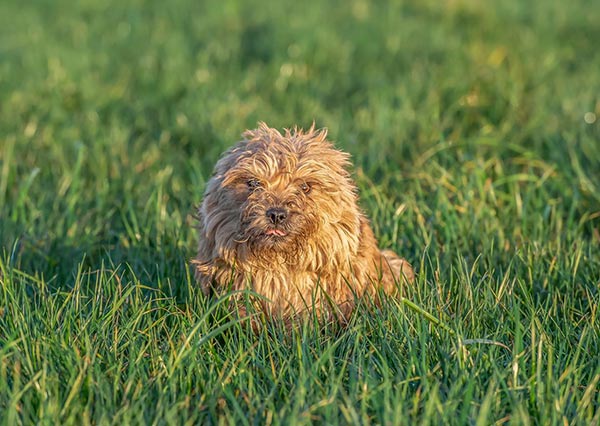Cairns are a cheerful, alert, lively and extrovert breed.
They make unbelievably fun, sweet and loving companions, greeting you with a range of melodic tones! They are happy as a sofa dog but equally enjoy exploring undergrowth and hidey holes!
Cairns are a cheerful, alert, lively and extrovert breed.
They make unbelievably fun, sweet and loving companions, greeting you with a range of melodic tones! They are happy as a sofa dog but equally enjoy exploring undergrowth and hidey holes!

Cairns are a non-shed breed which is perfect for allergy sufferers. They have a hardy wire like outer coat and a short soft close undercoat. They do require regular grooming and stripping at experienced groomers to maintain their alert foxy expression.
Origin
Cairns are one of the oldest British breeds, originating from the Isle of Skye, in Scotland. The Cairns breed has been known since the 15th century. They gained their name from their hunting technique; chasing and ‘routing out’ their quarry from ‘cairns’ (mounds of stones or rocks).
Trainability
They are assertive and ‘dedicated to job in hand’ so they do require a solid training and well established & consistent boundaries. They love digging and chasing vermin, so training is essential. Cairns can be bossy, so forming a strict ‘pecking order’ is also advisable.
Our Cairn Terriers
Our breeding journey began with Cairns. Cairns have been part of our family for over 3 decades. They are usually the first to greet you when you arrive with their dulcet tones! Their cheeky temperaments and happy expressions always put a smile on your face. Our Cairns are fantastic pets, they are great with our children, frequently playing ball, hunting for vermin or even retrieving the dummy with the gundogs!
Cairn Terriers can be susceptible to hereditary eye disorders, however we are please to announce that all of our Cairn terrier have regular eye tests, all of which are ‘clear’ from any hereditary condition. All of our cairns are also extensively DNA tested to ensure any puppies we breed at minimal risk of any other hereditary conditions.
